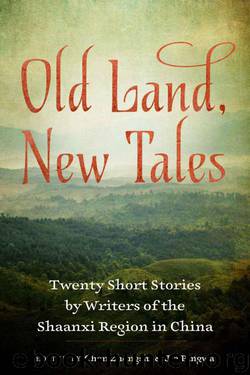Old Land, New Tales: Twenty Short Stories by Writers of the Shaanxi Region in China

Author:Chen Zhongshi & Jia Pingwa [Zhongshi, Chen]
Language: eng
Format: epub
Publisher: AmazonCrossingEnglish
Published: 2014-07-15T07:00:00+00:00
5
It was the evening of August 5, 1945. The dreadful alarm horn went on the whole evening. After a quick supper, all the people fled to the air-raid shelters.
It was August in Hiroshima, so it was stuffy and humid. The air inside the bunkers was no good at all—stuffy, hot, humid, moldy. People had to crowd on the wet floor in the cavelike shelters, hoping for the alarm to cease. Everyone wanted to go home and take a shower and rest. The morning of August 6 arrived, and the air-raid alarm finally ended. People started to head home, sweaty and tired. Years of continuous war had brought the whole country of Japan into profound poverty and exhaustion; the feeling of war weariness was their constant companion. It was hard, not knowing when the war would end or what the outcome would be.
Hiroshima was home to the most important military base in Japan during the war period. Etajima Island in the Seto Inland Sea was the command center of the Japanese Royal Navy. The military factories and shipbuilding factories in Hiroshima were the backbone of military logistics and weapons supplies. Ujina Port served as the launching site of the Japanese forces; from there Japan could invade the Chinese mainland. Thousands of Japanese soldiers boarded military boats, fully armed, and traveled across the Japanese sea to fight for the emperor and for their so-called East Asia Prosperity Plan.
Meanwhile, thousands of bodies of soldiers who’d died in the war, their bone ashes packed in white cloth, were shipped back via Ujina Port to their final destinations, their family homes. The local residents were used to the quiet parade of grieving relatives walking to the cemetery, the familiar white packages in their arms, containing the remains of their husbands or sons.
August 6 was a bright, clear day—blue sky with few clouds overhead. The Japanese call this a very fine day, or great fine day—just like the term in Chinese for a bright, clear day after snow. But that early morning, the weather was already hot. You’d be sweating after just a few steps in the open air.
The Yamamoto family left the shelter, heading for home. Father Yamamoto looked at the blue sky above and said, “No rain. Even a little rain would cool us off.” He turned back and looked at his wife and at his daughter Etako. Etako smiled at her father, saying nothing. Father Yamamoto waved at them, paused for a moment, and then started making his way toward the station. He was going downtown, where he was a teacher in a middle school. Etako’s mother, watching him leave, said her usual good-bye: “We’ll be waiting for you to come home soon.”
Etako was in senior high school. She would graduate soon. Today she looked forward to seeing her friend, getting together after school to do their homework and get some exercise. In her small handbag, there was a lunch box with some food that her mother had made for her the night before.
Download
This site does not store any files on its server. We only index and link to content provided by other sites. Please contact the content providers to delete copyright contents if any and email us, we'll remove relevant links or contents immediately.
The Hating Game by Sally Thorne(19212)
The Universe of Us by Lang Leav(15057)
Sad Girls by Lang Leav(14396)
The Lover by Duras Marguerite(7885)
The Rosie Project by Graeme Simsion(6363)
Smoke & Mirrors by Michael Faudet(6174)
Big Little Lies by Liane Moriarty(5778)
The Shadow Of The Wind by Carlos Ruiz Zafón(5680)
The Poppy War by R. F. Kuang(5674)
An Echo of Things to Come by James Islington(4842)
Memories by Lang Leav(4791)
What Alice Forgot by Liane Moriarty(4617)
From Sand and Ash by Amy Harmon(4487)
The Poetry of Pablo Neruda by Pablo Neruda(4084)
The Tattooist of Auschwitz by Heather Morris(3834)
Ficciones by Jorge Luis Borges(3620)
Guild Hunters Novels 1-4 by Nalini Singh(3453)
The Rosie Effect by Graeme Simsion(3451)
THE ONE YOU CANNOT HAVE by Shenoy Preeti(3357)
